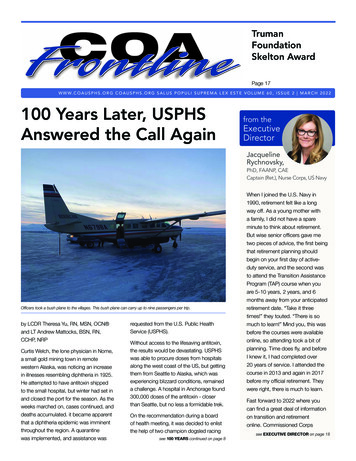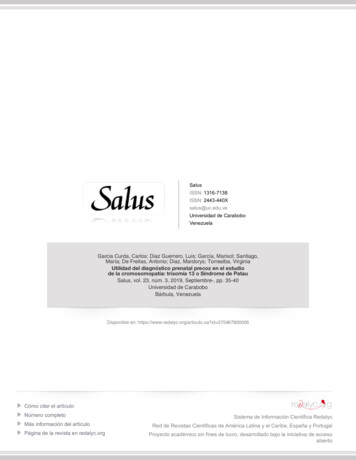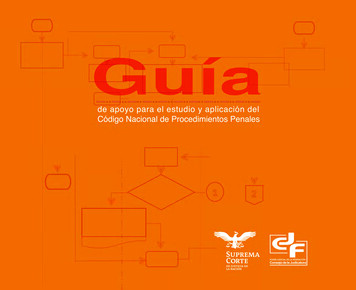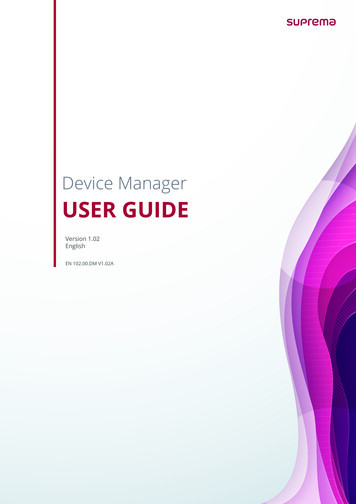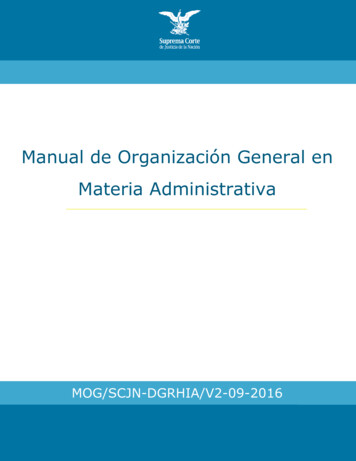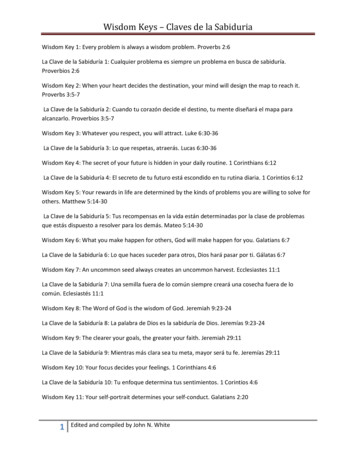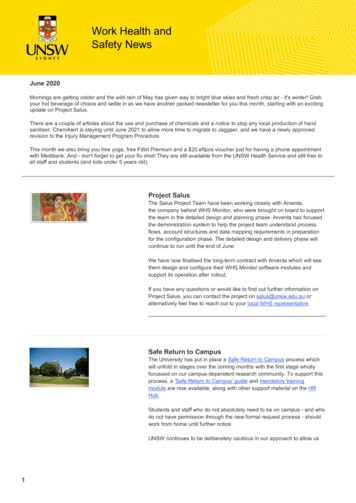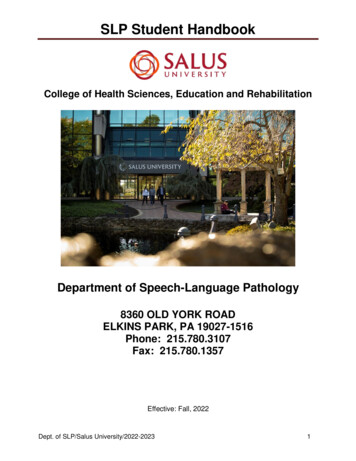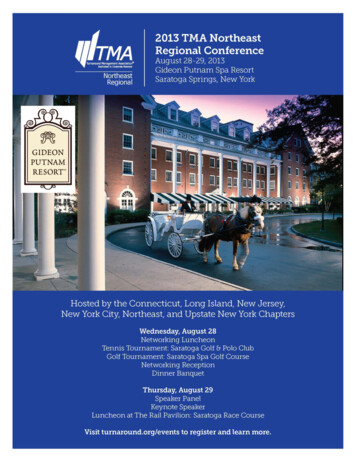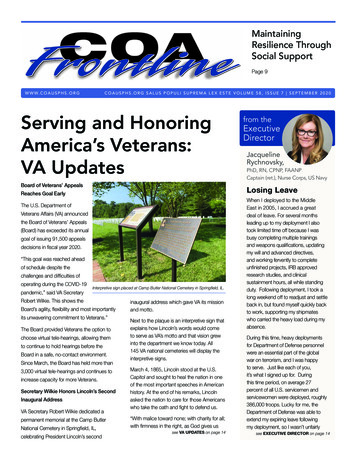
Transcription
MaintainingResilience ThroughSocial SupportPage 9W W W. C O A U S P H S . O R GCOAUSPHS.ORG SALUS POPULI SUPREMA LEX ESTE VOLUME 58, ISSUE 7 SEPTEMBER 2020.Serving and HonoringAmerica’s Veterans:VA UpdatesBoard of Veterans’ AppealsThe U.S. Department ofVeterans Affairs (VA) announcedthe Board of Veterans’ Appeals(Board) has exceeded its annualgoal of issuing 91,500 appealsdecisions in fiscal year 2020.“This goal was reached aheadof schedule despite thechallenges and difficulties ofpandemic,” said VA , RN, CPNP, FAANPCaptain (ret.), Nurse Corps, US NavyLosing LeaveReaches Goal Earlyoperating during the COVID-19from theInterpretive sign placed at Camp Butler National Cemetery in Springfield, IL.Robert Wilkie. This shows theBoard’s agility, flexibility and most importantlyits unwavering commitment to Veterans.”The Board provided Veterans the option tochoose virtual tele-hearings, allowing themto continue to hold hearings before theBoard in a safe, no-contact environment.Since March, the Board has held more than3,000 virtual tele-hearings and continues toincrease capacity for more Veterans.Secretary Wilkie Honors Lincoln’s SecondInaugural AddressVA Secretary Robert Wilkie dedicated apermanent memorial at the Camp ButlerNational Cemetery in Springfield, IL,celebrating President Lincoln’s secondinaugural address which gave VA its missionand motto.Next to the plaque is an interpretive sign thatexplains how Lincoln’s words would cometo serve as VA’s motto and that vision grewinto the department we know today. All145 VA national cemeteries will display theinterpretive signs.March 4, 1865, Lincoln stood at the U.S.Capitol and sought to heal the nation in oneof the most important speeches in Americanhistory. At the end of his remarks, Lincolnasked the nation to care for those Americanswho take the oath and fight to defend us.“With malice toward none; with charity for all;with firmness in the right, as God gives ussee VA UPDATES on page 14When I deployed to the MiddleEast in 2005, I accrued a greatdeal of leave. For several monthsleading up to my deployment I alsotook limited time off because I wasbusy completing multiple trainingsand weapons qualifications, updatingmy will and advanced directives,and working fervently to completeunfinished projects, IRB approvedresearch studies, and clinicalsustainment hours, all while standingduty. Following deployment, I took along weekend off to readjust and settleback in, but found myself quickly backto work, supporting my shipmateswho carried the heavy load during myabsence.During this time, heavy deploymentsfor Department of Defense personnelwere an essential part of the globalwar on terrorism, and I was happyto serve. Just like each of you,it’s what I signed up for. Duringthis time period, on average 27percent of all U.S. servicemen andservicewomen were deployed, roughly386,000 troops. Lucky for me, theDepartment of Defense was able toextend my expiring leave followingmy deployment, so I wasn’t unfairlysee EXECUTIVE DIRECTOR on page 14
COA MemberBenefitsCapitol Hill RepresentationEfforts on Capitol Hill continuallysupport all Commissioned Corpsofficers – active duty and retiredLocal RepresentationCOA Local Branches provide venuesfor meeting fellow officers and aforum for the discussion of issueswithin the Commissioned CorpsNewsletterNewsletter reports on monthlyactivities and items of interest aboutthe Corps & COAInsurance ProgramsLow-cost insurance programsthat may continue as long as yourmembership in COA remains current 7,500 for Online Degrees 7,500 scholarships to earn onlinedegrees, which @SimmonsHealthcareMBA@SimmonsIRonline (American)MBA@AmericanNYMC Online MPH50 percent discount for the onlineMPH and certificate programsScholarship ProgramCollege scholarships for children andspouses of COA membersRibbonAuthorized to be worn on the PHSuniform by members in good standingwhen attending COA functionsFFICERSASIATIONCOMMISSIOOEDCSONOFTH.NCE USPHS ILegislative UpdateAdvocates Organize to Save theUniformed Services Universityby Judy RensbergerThe national treasure known as theUniformed Services University ofthe Health Sciences (now officiallyabbreviated USU, not USUHS), isunder threat by budget analysts inthe Department of Defense. Leadingthe charge as part of a defense-widereview is a unit known as DoD CostAssessment and Program Evaluation,or CAPE. The Military Health Systemalready has endured over 70 billionin cuts since 2012, according tothe advocacy group Friends of theUniformed Services University, Inc.Making the case for USUFriends of USU., argues that what theCAPE budget analysts want to do isserious overkill. They point out thebeneficiary cost curve was flattenedstarting in 2011, while U.S. spendingon civilian health care has continued toincrease by at least six percent per year.USU advocates also point out thatTRICARE beneficiaries are beingpushed out of understaffed militaryhospitals and clinics and into theprivate healthcare network. In FY2020, this would have resulted in an“overspend” of 2 billion except foremergency supplemental fundingthat was authorized in response toCOVID-19. But this is temporary relief.Taking the LeadFriends of USU, Inc., has developed adetailed, three-page case statement. It isaccompanied by a densely packed list of16 talking points. Leaders met with U.S.Senator Chris Van Hollen (D-Maryland)to underscore their view that the mostrecently proposed budget reductions are“enormous, numerous, and harmful.”Friends of USU, Inc. made an earlystop by The Military Coalition’s (TMC)Health Care Committee, which wrote aletter for TMC to send to Congress.The president of Friends of USU, Inc.is Thomasine Ilyas Alvarez. She is alsothe executive producer of “Fightingfor Life,” a critically praised 2008documentary about USU. (Accessiblethrough YouTube, it is not to beconfused with at least two other films ofthe same or similar titles.)In addition to Mrs. Alvarez, fourother leaders of Friends of USU, Inc.participated in the meeting with SenatorVan Hollen and continue to lead theoverall effort. They are: Everett Alvarez,Jr., CDR, USN (ret.), a former Chair ofsee LEGISLATIVE continued on page 13
Lessons from an Old School Pharmacist2) Help each other. For many years, I workedin CDER’s Office of Regulatory Policy onissues related to the Prescription Drug UserFee Act (PDUFA). My colleagues would tellothers if they had an issue with PDUFA: “CallMike. He will help you.” There were plenty ofnuances to submissions under PDUFA andnot all project managers, whether at FDA orin industry, were aware of them all. But theyknew if they had a problem, they could callor email me, and I would help them out. Helpothers. Yes, you do need to do your job, butyou also need to help others. Doing so willbuild up good will, which will help you in yourcareer.by Captain Mike Jones, RPh, USPHS (ret.)I was lucky enough to start my federal careerin the Division of Generic Drugs (now theOffice of Generic Drugs) in the Center forDrug Evaluation and Research (CDER) atthe Food and Drug Administration (FDA)in Rockville, Maryland. At the time, I didn’tknow much about the Commissioned Corpsor FDA, but I was told that I would workMonday through Friday with weekendsand holidays off and I would not be given abeeper, which sounded good to me.When I first started in the Division of GenericDrugs, it was right after the generic drugscandal hit and it seemed like new policiesand procedures were being implementedevery day. But formal policies and proceduresdo not always help you successfully navigatethe work environment. Here are some things Iwish I knew when I was first starting out.1) Do your job. If you can’t do your job, yourcareer will suffer. I once had a coworkerwho was more focused on advancing hiscareer than doing the work assigned to him.When a high-profile project came up, it wasinitially assigned to him but because he fellso far behind, the project was reassigned tome instead, and I was eventually awardeda medal for completing the assignment. Iwould not have had this opportunity if I hadnot been diligent in completing my ownassignments.3) Talk to each other. One of the biggestthings that drives me crazy is when the lefthand doesn’t know what the right hand isdoing. For example, CDER is big organization. and industry knows this. Many times,you will get a question from industry askingfor advice. But do not assume you are theonly person being asked. Hopefully, theadvice you give will be consistent with whatsomeone else in CDER is telling them, butyou never know. I try to get enough detailswhen I’m contacted so I can figure out whoelse may have been contacted with the samequestion. Then I ask around to see if any ofmy colleagues have been contacted andwe shared information to give a consistentresponse. But not everyone does this, whichcan lead to inconsistencies in the adviceshared. It is better to let others know whatis going on than to keep that information toyourself.4) Be patient. When I first came to FDA, Iwas very impatient. I did not realize thereis regular time and then there is regulatorytime. Who knew? When I was working in thehospital and a pharmacy order was received,you filled it. It did not take a federal impactstatement to fill the order. In the regulatoryworld, instead of minutes or hours, you arelooking at days, weeks, months, or evenyears to take a regulatory action. I rememberscratching my head thinking of projects thatmy summer interns could complete duringthe few short months they would be at FDA.Such projects did exist, but often they wereonly small pieces of bigger projects andthe students would never see the ultimateprojects being completed during their time atFDA. I would have to explain the process andlet them know that they had to be patient.Even with an explanation, students wouldget frustrated with the slow pace of theregulatory process. I did, too. Patience had tobe learned, by students and by me!5) Be patient (yes, again!). Early in my career,I would receive an email and I would want toimmediately respond. Experience now tellsme that this may not always be prudent. Inthis day and age, we all expect an immediateresponse. But sometimes you do not haveall the facts. Sometimes you must do somehomework. Sometimes the issue resolvesitself without your intervention. Practically,it may be wise to wait a day. See if timeresolves your problem. Take time to considerall the issues and your response. (As anaside, sometimes your email response mayneed a “tone” check, so be sure to have atrusted colleague as a second set of eyeswho can give you feedback on your response– another reason to wait until the next day!)This does not mean ignore the requester.I’ve found that people don’t always needan answer right away, but they do want toknow that you are working on their question.Send an email stating that you are preparinga response and provide an estimate of whenthey can expect your response. Folks arevery grateful when you keep them posted onthe status of their issues.6) Solve problems; don’t make them. I’vehad several good supervisors over the years.One important lesson I learned from oneof them was avoid coming to your bosswithout a solution. Folks do not want to hearproblem after problem ad nauseam. Yoursupervisor will be much more receptive if youare prepared with an analysis and possiblesolutions. At the end of the day, your waysahead may not be the answer you land on,but they will be an important part of theproblem-solving process and your supervisorwill be grateful. So, do not be a problemmaker; be a problem solver.This list is not exhaustive . I have over 50of these hints that I have written down asreminders over the years, but I’ll have to savethose for another time.September 2020 Page 3
COF President’s CornerExploring the Future of Public Healthby Rear Admiral Steve Solomon, MD,FACP, FIDSA, USPHS (ret.)It has been almost seven months since theCDC, accurately and appropriately, warnedAmericans about the threat of widespreadcommunity transmission of SARS-CoV-2and predicted that “disruption to everydaylife might be severe.” At the time, whenless than two dozen cases of COVID-19had been diagnosed in the United States,that warning, while prophetic, was basedon decades of experience and a detailedknowledge of the science of epidemiology.Since that time, we have learned muchabout the effectiveness and the limits ofthe public health enterprise in the UnitedStates. The list of things we have learned islong and growing, and there will be manymore lessons to come as the pandemiccontinues. In this brief column, I wouldlike to share two thoughts of the many wecould and hope to discuss over the comingmonths.The first is that while both praise andcriticism of public health agencies andpublic health workers has been andcontinues to come from a variety ofdifferent sources, I know that our currentand former colleagues in public health, thecareer professionals with whom I workedfor many years, remain dedicated to theirmission of evidence-based, science-drivenassessment, policy development andhealth protection. We can all be confidentthat the voices and recommendationsof these career professionals are alwaysbased on their best judgment and the bestscience, whether those recommendationsare accepted or adopted by the officials towhom they report. As the pandemic goesPage 4 September 2020on, with its growing cost in lives, illness,disability and economic loss, all of us inpublic health, especially those of us whono longer serve on the front lines duringthis crisis and who face no restrictions onwhat we can say publicly, need to speakup in support of our colleagues and thevalue of their work, centered on data,medical science, and rigorous research.The second thought is that as importantas our support is now and in the comingweeks and months, it will be even morecritical as the pandemic eventually isconquered, hopefully with a globalprogram to distribute and administersafe and effective vaccines. At thatpoint, the investigations, look-backs anddevelopment of after-action reports will beunderway. It is not too early now, especiallyfor those of us not engaged in the dayto-day struggle against COVID-19, to bethinking about what comes next.It’s worth remembering that over thirtyyears ago, in its report entitled The Futureof Public Health, the Institute of Medicinewrote that the United States “has lost sightof its public health goals and has allowedthe system of public health activities to fallinto disarray.” That report made a seriesof recommendations, as did other IOMreports on public health, health care, andemerging infectious diseases, and as didnumerous other reports from governmentaland non-governmental sources. Over theyears, some of those recommendationswere adopted, most were not.In retrospect, and considering ourcurrent circumstances, it seems thatthose recommendations, often notadopted because they were viewedas too expansive and too costly, werenot as extensive or demanding as wasneeded. The public health system at everylevel needs more: more funding, morepersonnel, more support from decisionmakers, and most importantly, as the IOMwrote in 1988, “public health requiressupport by members of the public—itsbeneficiaries.”With your help, we can begin to exploreideas about the future of public healthpost-COVID and develop a strategy forconstructively contributing to what will bea long and complex debate about policiesand programs that will determine howgovernments at the Federal, state and locallevels can fulfill their public health mission.Please send your ideas, your suggestions,your concerns and your observations toFrontline@coausphs.org, with the subjectline “Future of Public Health”, so we canbegin to think together about where publichealth needs to go next and how we mightget there. Updates about this conversationwill be published in future issues ofFrontline and posted, starting next month,on the COF website.
COA Legislative Efforts for FlexibleSpending Accountsby Jesse P. Samluk, PhD, JD (Candidate – 3L)As part of my legal education, I am conducting pro bonoadvocacy on behalf of COA. My PhD is in Electrical and ComputerEngineering, and I am a third-year law student at WidenerUniversity Delaware Law School. I started assisting COA whileCOL (ret.) Jim Currie was at the helm and continue under CAPT(ret.) Jacque Rychnovsky. It is an honor and privilege to assistCOA in its efforts to continually improve the lives and careers ofUSPHS officers.The purpose of this piece is to provide an analysis of a givenlegislative effort that COA looks to have signed into law, andrecommendations for moving forward. Some readers mayquestion what goes on behind-the-scenes to get an idea signedinto law, and why USPHS seems to always play catch-up with theother uniformed services.My focus here has to do with the implementation of FlexibleSpending Accounts (FSAs). COA Government Relations DirectorJudy Rensberger mentioned FSAs in the June-July 2020 issueof Frontline. They cover eligible medical expenses as a pre-taxbenefit. Many employers, including the Federal government,provide this benefit. There are different types of FSAs, such ashealth care FSAs, limited expense FSAs, and dependent careFSAs. With FSAs, the IRS caps how much pre-tax funds you cancontribute during a given year. Some of the different types of FSAsalso allow a maximum “carry over” amount to use in the nextyear contingent upon registering for a FSA in the following year.Elections to participate in FSAs typically occur during a benefits“open season” or any type of qualifying life event (birth, marriage,divorce, etc.).Historically, given TRICARE and its multitude of flavors betweenactive and reserve/guard components, FSAs were not authorized.However, the “Jobs and Childcare for Military Families Act of 2019”(S. 1802) would provide the necessary language to provide FSAsfor the armed forces. But the drafters of this legislation inherentlyomitted USPHS and NOAA because they are not “armed forces.”The fix? Using “uniformed services” instead of “armed forces.”The process of correcting legislation is never as easy as it seems.As for proposed legislation, the best way to go about correctingthe language is to contact the office of the original sponsor of thebill, either directly or by a interested organization, such as COA.For this measure, it would be Senators Tim Kaine (D-VA), JohnBoozman (R-AR), Jon Tester (D-MT), Thom Tillis (R-NC), andKyrsten Sinema (D-AZ). However, another approach to correct thelanguage would be through the “markup” process. The markupprocess is where congressional committees and subcommitteesmeet to discuss, correct, or even rewrite proposed legislation.I personally reached out to amember of my congressionaldelegation (Senator TomCarper, D-DE) since he is onthe Committee on Finance, thecommittee of jurisdiction forS.1802, but no markup sessionis scheduled for this bill, and it isgrowing increasingly unlikely forthe 116th Congress. A more likelypossibility is for this legislation to be “swept” into larger legislation,akin to how the USPHS Ready Reserve was re-established underthe CARES Act. Prior to the CARES Act being signed, the Senatemeasure for the Ready Reserve advanced, but the House measurestalled in committee.So, what can you do? Write your delegation with the followinginformation. For those of you that reside in Virginia, Arkansas,Montana, North Carolina, or Arizona, contact those offices aboutsupporting this bill since they are the original cosponsors. Makesure you refer to the bill number (S.1802) and tell them that thelanguage needs to be changed to the following:For S. 1802 §2(b) and S. 1802 §3(a) to read “Uniformed Services”instead of “Armed Forces”, and for S. 1802 §3(c) to includethe Secretaries of Health and Human Services and Commerce,respectively.The House measure (H.R. 5876 - Jobs and Childcare for MilitaryFamilies Act of 2020) would follow a similar approach:H.R. 5876 §2(b) and H.R. 5876 §3(a) to read “Uniformed Services”instead of “Armed Forces”, and for H.R. 5876 §3(c) to includethe Secretaries of Health and Human Services and Commerce,respectively.All too often we fight for corrective language (e.g. UniformedServices) to include USPHS and NOAA. However, the more weeducate our legislators about these drafting errors, the hope inthe future is that we will not have to keep introducing amendinglegislation to correct the original measure.Do you have questions on this legislation or any other ideas thatshould be explored? Feel free to contact COA’s Legislative AffairsCommittee through Judy Rensberger, Government RelationsDirector, at jrensberger@coausphs.org.Disclaimer: While the author is a current law student, this articleis written for informational purposes only, and does not constitutelegal advice. Should you need legal advice, contact a licensedattorney in your local area.September 2020 Page 5
You’ve chosennursing as yourcareer.Now, choose thepath that will takeit forward.Top-ranked Online Master of Science in Nursing Prepares graduates for advanced practice nursing in avariety of settingsProvides access to world-class faculty and clinical experiencesTwo years full-time or three years part-timeFour online specialties to select from: Family Nurse Practitioner,Psychiatric Mental Health Nurse Practitioner, Clinical Nurse Leaderand Neonatal Nurse PractitionerLearn more: go.osu.edu/tm usphsOnline BSN to DNP Reach the highest level of practice expertiseDevelop your clinical and leadership skillsEarn your DNP, master’s degree and be eligible for advanced practice certificationThree years full-time or four years part-timeThree online specialties to select from: Family Nurse Practitioner, PsychiatricMental Health Nurse Practitioner and Neonatal Nurse PractitionerLearn more: go.osu.edu/bsndnp usphsPage 6 September 2020
Officers on Speech Science Podcastby LT Courtney Wood, M. Ed., CCC-SLPLCDR Carla ChaseLT Courtney WoodAfter reading about speech-languagepathologist (SLPs) serving in uniform inthe American Speech-Language andHearing Leader Live blog, Ms. MichelleWintering, MA, CCC-SLP, host of theSpeech Science Podcast, becameinterested to learn more about the USPHSCommissioned Corps. She invitedUSPHS SLPs CDR Erik Cala, LCDR CarlaChase, and LT Courtney Wood to discusstheir roles on the podcast. The SpeechScience Podcast presents updates, casestudies, events, and best practices inspeech-language pathology and hostsinterviews of practicing professionals.The first part of interview highlightedUSPHS SLPs in non-clinical billets andwas published on August 18. The secondpart of the interviews featured USPHSSLPs in clinical billets and was releasedon August 25.The Speech Science Podcast interviewsprovided the SLPs an excellentopportunity to promote public awarenessof the essential works the USPHS officersprovide and of the daily dedication theCommissioned Corps members showin their service to health. The SpeechScience Podcast and the USPHS SLPinterviews are available online at https://speechscience.podbean.com/Ohio Issues USPHS License Platesby CAPT Alan Echt, USPHS (ret.)This summer, Ohio released licenseplates to honor active duty and retiredUSPHS officers. A USPHS veteranlicense plate will be coming later. Thiswas the culmination of two years ofwork that began at the urging of amember of the Cincinnati Branch.In 2018, the Ohio General Assemblypassed HB 194, which required theOhio Department of Veterans Services(ODVS) to work with the Registrar ofMotor Vehicles, within the Departmentof Public Safety to develop andmaintain a program to establish andissue nonstandard license plates“recognizing military service and militaryhonors pertaining to valor and service.”Previously, each new Ohio militarylicense plate required passage of astandalone bill. According to testimonyand improve the way Ohio creates newin Dayton, and the COA member keptlicense plates to honor its military menthe ODVS Administrator’s businessand women.card. In a series of emails over twoShortly after HB 194 became law, ayears, the ODVS Administrator patientlymember of Cincinnati COA contactedthe ODVS Administrator of the Office ofEmployment, Education, and Policy toexplained the process of issuing newmilitary license plates while the COAmember periodically checked on theask for license plates recognizing theprogress of the USPHS plates. Afterto the passage of HB 194, there wereUSPHS to be included in the programa delay due to waiting for permissiontwenty-two separate Ohio revisedrequired by HB 194. They had met atfrom USPHS to use the anchor andcode sections related to military licensethe buffet line at the 2015 MOAA Ohiocaduceus emblem, the first USPHSplates. The bill sought to streamlineCouncil of Chapters State Conventionplates were released this August.from one of the bill’s sponsors, priorSeptember 2020 Page 7
My practice is health education andtraining through a global health lens.My passion is saving lives.Join me and earn a PhD, DrPH,MPH, MSPH, MHA, BSPH orgraduate certificate in an online,n-campus or blended format.Reduced rate tuition for eligibleonline courses and programs isoffered.1#4#ranked in Floridaranked nationallyAmong all four-year U.S institutionsMilitary Times, 2020publichealth.usf.edu/apply 813-974-6505 preadmissions@health.usf.eduUniversity of South FloridaCollege of Public Healthour practice is our passion.Page 8 September 2020
MaintainingResilienceThrough YourSocial SupportBubbleby LCDR Jill Gelviro and LCDR Madalene MandapWLSG members in 2017. From left: LT Stephanie Ogle, LCDR Jill Gelviro, LTKayla Vujovich, LCDR Cathy Arnatt, LCDR Madalene Mandap, and LCDR TheresaCastellanosIn December 2014, twelve female Commissioned Corps officersmet in the Washington D.C. area for the first USPHS Women’sLeadership Support Group (WLSG). The group was broughttogether, under the guidance of RADM Pamela Schweitzer (Ret.),to support female officers in leadership roles and to recognizethe challenges of everyday demands of career and family. Today,the USPHS WLSG has grown to over 400 members extendingacross all categories of the Commissioned Corps and throughoutthe nation. One of the top priorities for the National PreventionStrategy is mental and emotional well-being, which the WLSGmembers continue to support.Since the start of the COVID-19 response, our lives havechanged in so many ways. Whether it be family, financial or workresponsibilities, it is important for us to find work-life balance.Continuing with the goals of the USPHS WLSG, the Region 10Alaska Native Medical Center/Southcentral Foundation (ANMC/SCF) WLSG group led by LCDR Jill Gelviro maintains resiliencethrough their “support bubble.” We have found solace in sharingperspectives and experiences in our own lives on the importanceof career and family. Prior to the pandemic, the group metquarterly. Additionally, the group has supported local communities,participating in COA events taking aim at health, wellness andofficership. In fact, several group members have served on theExecutive Committee or Subcommittees of the Aurora BorealisCOA.Members of the WLSG agree that the social support afforded bygroups like these is invaluable. We share unique challenges in ourcareers and can lean on each other for advice and mentorship oneverything from conflict resolution to raising young children. Thecurrent pandemic has suddenly forced some mothers to maketough decisions while maintaining a full workload as they workfrom home. An officer wrote, “It helped talking with a fellow officer[in a similar situation] and commiserating with what we will dowith this next school year. Honestly, simple things like our walk/talks help me both mentally and physically because I just don’t getsee SUPPORT BUBBLE on page 10WLSG members volunteer to support the 2019 Alaska Women’s Gold NuggetTriathlon. From left: LCDR Jill Gelviro, LCDR Madalene Mandap, LCDR Cathy Arnatt,LT Kayla VujovichWLSG members participate in a PHS Athletics Virtual 5K event in July 2020 inthe Anchorage, AK mountain trails. From left: LCDR Madalene Mandap, LT KaylaVujovich, LCDR Cathy Arnatt, LCDR Jill Gelviro, LCDR Theresa CastellanosSeptember 2020 Page 9
SUPPORT BUBBLE from page 9WLSG members enjoy a lunchtimewellness walk around the ANMCcampus lake and trail system. Fromback left: LCDR Madalene Mandap,CDR Juanita Luna-Greene, LTKimberly Warren, LCDR TheresaCastellanos, LCDR Jill Gelviro. Front:LCDR Cathy Arnattout much!” Another member recounts,“I remember breathing the biggest sighof relief that I could let my guard downand share my struggles in a safe spacewith fellow officers. Especially now, withlockdown and social distancing, it isso important to maintain some type ofconnection with each other.”The WLSG plans to host future bookclubs in the coming months. One bookon the agenda is “Together: The HealingPower of Human Connection in aSometimes Lonely World” by former USSurgeon General Vivek Murthy.If you are interested in learning moreabout the Women’s LeadershipSupport Group, please email:forum4femaleofficers@gmail.comMembers of the WLSG group atANMC/SCF include LCDR Jill Gelviro(leader), CDR Juanita Luna-Greene,LCDR Catherine Arnatt, LCDR TheresaCastellanos, LCDR Madalene Mandap, LTStephanie Ogle, and LT Kayla Vujovich.WLSG members stay connected via zoom to check-in on each other. Top left to right: LT Kayla Vujovich, LCDR CathyArnatt LCDR, Theresa Castellanos Bottom left to right: CDR Juanita Luna-Greene, LCDR Jill Gelviro, LCDR MadaleneMandapShannon James, EsqLaw Offices of David P. Sheldon, PLLCWorldwide Representation 202-552-0018DEFENDING THOSE ATTHE FOREFRONT OFPUBLIC HEALTHAdministrativeCOER Rebuttals and AppealsEEO ClaimsGrievancesPEBsSeparation BoardsADDRESSING THE UNIQUE NEEDS OF COMMISSIONED CORPS OFFICERSPage 10 September 2020
Silver Linings during the Pandemicby
50 percent discount for the online . MPH and certificate programs. Scholarship Program. College scholarships for children and . Assessment and Program Evaluation, or CAPE. The Military Health System already has endured over 70 billion in cuts since 2012, according to the advocacy group Friends of the Uniformed Services University, Inc .
